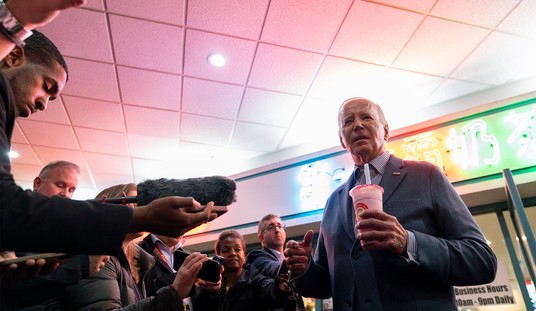Apropos of England’s royal baby, a kind word for monarchy is in order. The popular fascination with Britain’s royal family reflects something less shallow than a collective celebrity crush: the longing for something more permanent, more reverential in the character of the state. One of the most penetrating discussions of the issue was penned by the great Jewish theologian Michael Wyschogrod in the journal First Things in 2010. There is something profoundly inadequate in the mere rough-and-tumble of political interests so beloved of the Hobbesians who dominate what now passes for political philosophy on the secular right wing of American academia.
The moment we place any restriction on popular will (as does the US Constitution), Wyschogrod observed, we impose a higher criterion which must in some way be thought of as theological. That is obvious on a moment’s reflection:
To discuss theological criteria for the constitution of a secular republic runs against the grain of modern political thought, even though constitutional restrictions on popular sovereignty imply reliance on an authority that is greater than human. In a republic the people are sovereign, yet the purpose of a constitution is precisely to restrict the power of any future majority. If popular sovereignty is absolute, what right has a constitution to frustrate a future majority by, for example, imposing some form of supermajority? In the extreme case, suppose a majority of the delegates to a constitutional convention enacts a constitution that forbids any change forever, or requires a 98 percent majority of the future legislature to enact any constitutional change.
This is no different in principle from the two-thirds supermajority that the United States requires for constitutional amendments. The only basis for a polity to accept severe restrictions on popular majority rule is the conviction that the founding constitution derives its power from a higher form of sovereignty than the voters in any given legislative session. Without such a theological foundation, a republic cannot feel bound by the rules laid down by its founders. A purely secular republic would self-destruct because it could not protect its constitution from constant amendment.
That is not the way that classical political rationalism looks at the matter, but Wyschogrod’s logic is sound. Where does that higher authority come from? And how can it be embodied in politics? In America it was embodied in a religious consensus, as de Tocqueville explained so well in his 1836 Democracy in America. In England it is expressed not only by democratic forms, but also by tradition, and embodied by the monarchy, which also is the custodian of the national church. That is a problematic arrangement in many respects, but one that has endured and still has the power to evoke loyalty and love of country.
Since the conversion of the Visigoths in Spain and the foundation of the Merovingian dynasty in France around 600 C.E., though, the notion of monarchy in the West has derived in important ways from the biblical concept of monarchy, centering on the reign of King David — which we now know to be a historical fact, rather than a legend as an earlier generation of skeptical scholars falsely believed. And it is in the State of Israel today that the issue might be brought most clearly into focus, Wyschogrod argued.
Over at Mosaic, former Commentary editor Neal Kozodoy’s new online webzine, there is a lively debate over the relation between religion and state involving such luminaries as Profs. Moshe Koppel and J.J. Weiler, a professor of constitutional law at NYU. Israel does not have a written constitution because it has never reconciled its secular parliamentary democracy with its Jewish character. The Jewish religion cannot be left out of the constitution; nor can Israel be governed by Torah scholars.
Wyschogrod offered a solution more robust, in my view, than what is to be found in the Mosaic debate:
Israel must reconcile the requirements of its secular citizens, who wish to live in a modern parliamentary republic, and its religious citizens, who insist that religious and legal tradition must inform the Jewish state. The danger in secular rule is that modern Israel will fail to present itself unambiguously as a Jewish state and eventually lose the battle to remain a Jewish state….
The crowning of an actual Davidic monarch today would require prophecy to select the proper person. In the absence of prophecy, this is impossible—and the sages of Israel declared almost two thousand years ago that prophecy was gone from Israel. Israel nonetheless can be declared a Davidic monarchy without a reigning king. This action would build into the self-understanding of the state of Israel the messianic hope of the Jewish people, while excluding a messianic interpretation of the present state of Israel.
The solution that I propose is by no means unusual for a constitutional monarchy. It is a common occurrence in monarchy that no king is present or that the present king cannot rule, for example, due to youth. In such situations, a regent is appointed as a placeholder for a king. Such a placeholder can either be appointed or elected.
A constitutional monarchy with an empty throne would conform to the thrice-daily prayers of the Jewish people for redemption, as one of the Eighteen Benedictions states:
Return in mercy to Jerusalem Your city and dwell therein as You have promised; speedily establish therein the throne of David Your servant, and rebuild it, soon in our days, as an everlasting edifice. Blessed are You Lord, who rebuilds Jerusalem. Speedily cause the scion of David Your servant to flourish, and increase his power by Your salvation, for we hope for Your salvation all day. Blessed are You L-rd, who causes the power of salvation to flourish.
But it would also allow Israel’s democracy to function without theological interference of any practical kind.
In the Mosaic magazine debate, the University of Chicago scholar Yuval Levin quotes John Locke and other Western political philosophers in support of a role for the Jewish religion in the State of Israel. That is well and good, but the Jewish sources in my view are more pertinent than the Anglo-Saxon philosophers.
The nations of the West are all made in the image of ancient Israel, from the Visigoths and Franks of the low Middle Ages through to the Tudor monarchy. Political systems cannot survive without a higher authority; peoples cannot survive without the hope of life beyond mere physical existence. This great insight I learned from the German-Jewish theologian Franz Rosenzweig. That has a dark side, as I discussed in my 2011 book How Civilizations Die. If each nation believes itself to be chosen in the flesh like the Jewish people, it may justify wars with other nations on such grounds (that influenced Franco-Spanish rivalry during the Thirty Years War). Or it may turn into a Satanic parody of Election, as with Hitler’s “master race” delusion. The United States has the great advantage of lacking an ethnicity, and understanding itself (at its best) to be “almost chosen,” as in Lincoln’s famous joke.
It is appropriate for modern Israel, therefore, to provide a case in point for the relationship of theology and constitutional theory. Wyschogrod’s remarkable essay has broad implications for constitutional theory in general. We Americans will not install a monarch, but we must remember that our Constitution rests on a religious premise, as de Tocqueville understood so well a century and a half ago.
Here is a relevant extract from How Civilizations Die (and Why Islam is Dying, Too):
Christian chroniclers cast the newly-baptized European monarchs in the role of biblical kings, and their nations in the role of the biblical Israel. The first claims to national election came at the crest of the early Dark Ages, from the sixth-century chronicler St. Gregory of Tours (538-594), and the seventh-century Iberian churchman St. Isidore of Seville.
St. Gregory’s History of the Franks conflates the deeds of the Merovingian dynasty in Gaul with biblical events, in a salvation history intended to persuade the Frankish kings of their divine calling as leaders of Christendom. “One can see the historico-theological drama in Book II of the Histories Gregory’s conception of Gaul as a holy land, a New Israel,” writes Notre Dame University historian Phillip Wynn. “Here the author comes to grips with events central to his contemporary society, the establishment by Clovis of a Frankish kingdom in Gaul ruled by the Merovingian dynasty. How this happened within the framework of a divinely-actuated history and what lessons this past had for Gregory’s present explain many of the peculiar aspects of his narrative in Book II, including its disordered chronology and historical errors.'”[i]
And the historian Réne Rémond notes, “It was perhaps in France that the identification of religion with national destiny was oldest, because it was one of the oldest nations. At a very early date, a tradition accredited by the abbey of St. Denis presented the kingdom of France as the chosen nation, called upon, after Christ’s coming, to be the one to carry on the Israel of the Old Testament; hence the adage Gesta Dei per Francos—the deeds of God through the Franks.”[ii] The election of the Frankish king Charlemagne as Holy Roman Emperor in 800 C.E. provided a foundation for the French claim to chosenness.
If the Franks were the first European nation to discover their own national election in the manner of biblical Israel, the Spanish were not far behind. Seventh-century Spain was ruled by the Visigoths, “who considered themselves to be a chosen people with all the associated privileges and obligations. And in support of this proposition, the great Visigothic chroniclers such as St. Isidore, St. Julian, and Juan Biclarense argued that the Visigothic people was God’s instrument on earth,” literary critic Jack Weiner writes in his study of the theme of the “chosen people” in medieval Spanish poetry.[iii] It’s no accident that the Visigoth King Ricared I (586-601 C.E.) promulgated the first anti-Semitic laws on the European record, prohibiting circumcision, preparation of kosher food, observance of the Jewish Sabbath and festivals, and other forms of observance, on pain of death by burning. The nations that sought to replace Israel—rather than seek adoption into Israel—always viewed the continued presence of the Jewish people as a stumbling-block before to their own pretensions to Election.
[i] Phillip Wynn, “Wars and Warriors of Gregory of Tours’ Histories,” in Francia Forschungen zur westeuropäischen Geschichte Vol. 28, 2001 (Ostfildern 2001).
[ii] Religion and Society in Modern Europe, by Réne Rémond (Wiley-Blackwell 1999), p. 110-111.
[iii] Jack Weiner, El Poema de mio Cid (Edition Reichenberger 2001), p. 6.
*****
images courtesy shutterstock / Zvonimir Atletic / egd












Join the conversation as a VIP Member